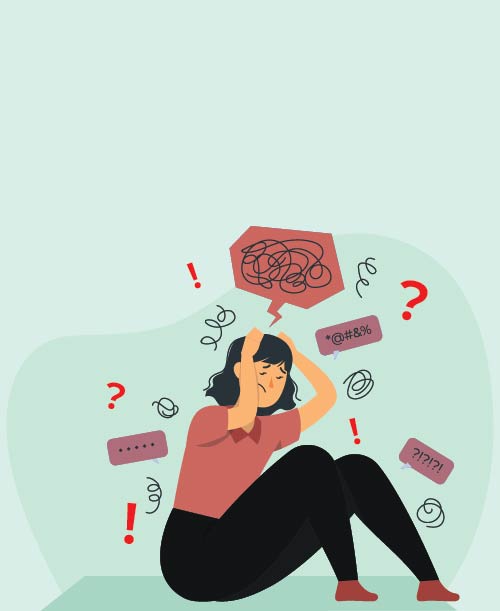

PTSD - Risk Factors, Complications and Treatment
Most people who go through traumatic events may have temporary difficulty adjusting and coping, but with time and good self-care, they usually get better. But if the symptoms get worse, last for months or even years, and interfere with your day-to-day functioning, then you may have PTSD. Getting effective treatment after PTSD symptoms develop is important to reduce symptoms and improve function. Read on to know more.
What is PTSD?
Post-traumatic stress disorder, or PTSD, is a mental health condition that develops after a person goes through a traumatic and life-altering experience. It is characterized by intrusive thoughts about the incident, recurrent distress/anxiety, flashback and avoidance of similar situations. PTSD can either be a temporary occurrence or it can have a long-term effect, and it can cause serious hindrances to one’s daily life if not treated properly or in a timely manner.
Risk Factors
People of all ages can have post-traumatic stress disorder. However, some factors may make you more prone to develop PTSD after a traumatic event. They are:
• Experiencing intense or long-lasting trauma
• Having experienced trauma earlier in life, such as childhood abuse
• Having a job that increases your risk of being exposed to traumatic events, such as military personnel and first responders
• Having other mental health problems, such as anxiety or depression
• Having problems with substance misuse, such as excess drinking or drug use
• Lacking a good support system of family and friends
• Having issue of mental health problems including anxiety or depression running in the family
Complications
PTSD can disrupt your whole life by interfering in your day-to-day activities. It may also increase your risk of developing other mental health problems, such as:
• Depression
• Anxiety
• Eating disorders
• Suicidal thoughts and actions
• Substance use disorder
Getting timely medical assistance and PTSD treatment can help to prevent the development of PTSD complications.
Treatment Options for PTSD
PTSD is treatable. Significant reduction in PTSD symptoms has been experienced after receiving the right professional support. Each individual responds differently to therapies and medications. So, you may need to try various interventions before learning what works best for you. PTSD treatment options available are:
• Cognitive Behavioural Therapy (CBT) – CBT is widely used for trauma treatment and it works by challenging negative thoughts you have about yourself or the world around you. In changing these thoughts, you will ideally experience more relief and confidence.
• Eye Movement and Desensitization Reprocessing (EMDR) – This can help reduce your reaction to trauma by helping you recognize your trauma triggers, learn new coping skills, and share your story without feeling as overwhelmed.
• Experiential Therapy – Therapies such as art, music, and dance can help treat PTSD symptoms as they allow the clients to express their feelings without talking about them directly.
• Medication - Antidepressants and anti-anxiety medicines can help reduce the intensity of PTSD symptoms. It’s also a viable option if you struggle with co-occurring depression or anxiety.
• Lifestyle changes – Certain lifestyles changes can help healing from PTSD and depending on your situation, these changes can range from subtle to dramatic.
Conclusion
After surviving a traumatic event, many people have PTSD-like symptoms in the beginning. However, most people exposed to trauma do not develop long-term post-traumatic stress disorder. Getting timely help and support may prevent normal stress reactions from getting worse and developing into PTSD.
Sources: Mayo Clinic, Medical News Today, Winchester Hospital, NIMH
Disclaimer: This blog provides general information and discussions about health and related subjects. The information and other content provided in this blog, website or in any linked materials are not intended and should not be considered, or used as a substitute for, medical advice, diagnosis or treatment. Kindly contact your Doctor before starting a new medicine or health regime.
Related Articles
Fun Activities And Ways To Overcome Stress
Stress Affecting Your Life? Here Are 5 Simple Remedies To Manage Stress
Mental Stress Can Affect Your Body – Find Out How
Effective Ways To Keep Stress Under Control
Published on November 14, 2022

















 Car Insurance
Car Insurance  Bike/Two Wheeler Insurance
Bike/Two Wheeler Insurance  Health Insurance
Health Insurance  Pet Insurance
Pet Insurance  Travel Insurance
Travel Insurance  Home Insurance
Home Insurance  Cyber Insurance
Cyber Insurance  Third Party Vehicle Ins.
Third Party Vehicle Ins.  Tractor Insurance
Tractor Insurance  Goods Carrying Vehicle Ins.
Goods Carrying Vehicle Ins.  Passenger Carrying Vehicle Ins.
Passenger Carrying Vehicle Ins.  Compulsory Personal Accident Insurance
Compulsory Personal Accident Insurance  Travel Insurance
Travel Insurance  Rural
Rural  Critical illness Insurance
Critical illness Insurance